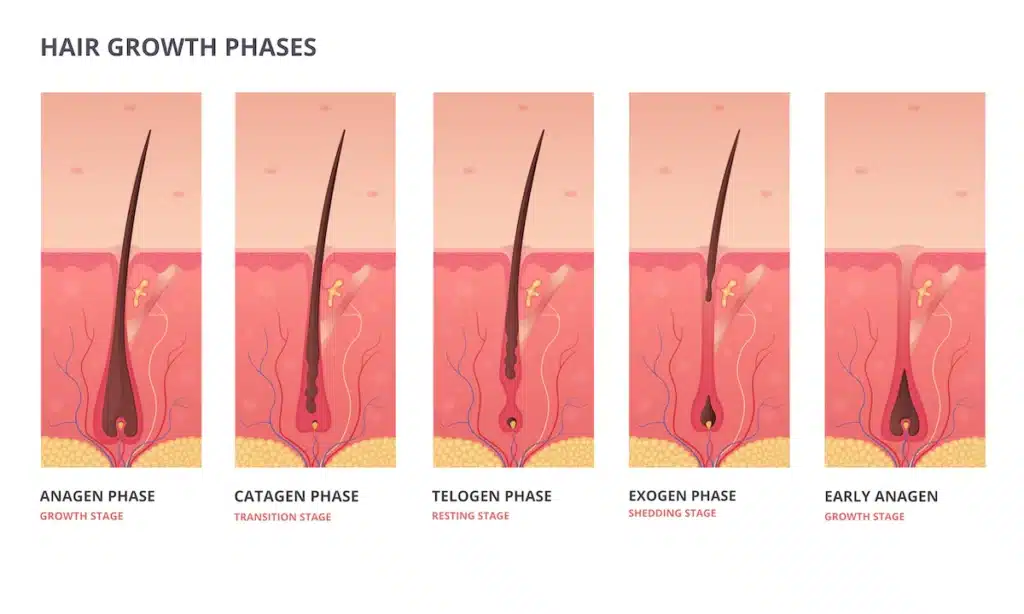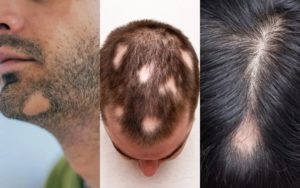Introduction
When we think about the common side effects of COVID-19, the first things that come to mind are the loss of smell or taste or maybe a persistent cough. We usually do not think about hair loss. However, recent studies show that Covid hair loss is genuine. Hair loss is among the 60 persistent symptoms often associated with long-term COVID-19.
So, if you are experiencing hair loss after recovering from COVID-19, you are not alone: In a 2022 study published in the Journal of Medicine and Life, 48 of 198 patients admitted for COVID-19 showed hair loss.
This type of temporary hair loss is known as Telogen Effluvium and isn’t unique to COVID-19 infection. Any severe stress event can trigger it. The good news is once the trigger for Telogen Effluvium is removed, the hair follicles return to their normal growth cycle, and the hair shedding decreases.
In this post, we explore the relationship between COVID-19 and hair loss, the effects of Telogen Effluvium, who is more at risk for this type of hair loss, and what you can do to reduce your hair loss.
What Is Telogen Effluvium?
Physical trauma and emotional stress are the primary triggers of Telogen Effluvium. These stressors may include nutritional deficiencies, chronic illness, childbirth, anxiety, and depression.
To understand Telogen Effluvium or TE, we need to understand the hair growth process. Our hair follicles usually go through three phases: the growth phase (anagen), the transitional phase (catagen), the resting phase (telogen), and the shedding phase (exogen).

The hair on your head is always in different stages. The bad news is that Telogen Effluvium can disrupt your hair’s natural growth in various ways, such as lengthening, shortening or delaying the different phases.
More of your hair might end up in the shedding phase, and you may see clumps of hair falling out. You are more likely to notice hair loss when washing or styling your hair. Your hair can become finer and thinner within just a few weeks.
What Is the Relationship Between COVID-19 and Telogen Effluvium?
If you have recently recovered from COVID-19, you may not immediately experience the effects of TE. Typically, it occurs about two to four months after the infection or triggering event.
This delay is because most hairs on your head (85 to 90 percent) are in the growth phase. Only about 10 to 15 percent are in the shedding phase. A severe emotional or physical stressor like COVID-19 can push more hair into the resting/shedding phase.
In most cases, people with COVID-19 are going through not only the physical stress but also the emotional anxiety associated with the diagnosis. According to recent studies, people infected with COVID-19 are four times as likely to develop this type of hair loss.
To help ease any stress caused by hair loss, it’s important to remember that it is a common condition and usually resolves on its own. However, if your hair loss is severe or lasts for more than a year, it’s best to consult your dermatologist to thoroughly examine your scalp and medical history and rule out any more severe conditions.
Is COVID-19 Hair Loss Permanent?
COVID-19-related hair loss isn’t usually permanent, regardless of the physical or emotional stressors. Telogen Effluvium does not usually cause any damage to the hair follicles or the scalp.
The hair follicles typically return to their normal growth cycle after six to nine months (sometimes up to a year). However, some people may experience a more persistent form of chronic Telogen Effluvium. It is best to consult a medical professional to treat hair thinning in chronic cases.
Are You More at Risk for COVID Hair Loss?
Specific populations may be more prone to experiencing TE after being sick. Anyone can be at risk for Covid hair loss, but certain predisposing factors exist. These may include:
- Gender: Women suffer from COVID-19-related hair loss more than their male counterparts. In a 2022 study published in the Journal of Medicine and Life, 39% of the patients suffering from COVID-19 hair loss were men, while 60% were women. 48 of 198 patients admitted for COVID-19 showed hair loss.
- Nutritional Deficiencies: If you had a previous dietary deficiency, particularly iron, biotin, and vitamin D, you could be more susceptible to hair loss after a prolonged fight with COVID-19. For instance, your body may prioritize making red blood cells over supporting hair growth if you have low iron levels.
- Weakened Immune System: Those who are immunocompromised are more vulnerable to severe infections, including COVID-19, and prolonged symptoms, which may put them at higher risk of developing TE. During periods of elevated community transmission, immunocompromised individuals may wish to take extra precautions like maintaining social distancing and updating their vaccines.
How To Deal With COVID-19 Hair Loss?
While hair loss due to TE is temporary, hair regrowth can take some time as hair grows at an average rate of one centimeter per month. During this time, a few tips can help you handle hair loss from TE, including:
- Patience: Though losing your hair can be scary, you likely will not face balding due to COVID-19 hair loss. So, patience is vital in dealing with this type of hair loss.
- Managing Stress Levels: Breaking long-term stress can help hair function resume more consistently. You can practice self-care measures as you deal with COVID-related hair loss. Meditation and breathing exercises are great ways to manage your stress,
- Medication: If your TE is not resolving independently and your hair keeps falling, you can try over-the-counter drugs like minoxidil.
- Supplements: If you are suffering from a nutritional deficiency, it can easily exacerbate your TE. Supplements like Dr. Acar’s hairpower booster pack can be a great way to tackle your weaknesses.
- Consulting With a Professional: If you have been experiencing hair loss for over a year, consult a dermatologist.
In Conclusion
We are still learning about the long-term effects of COVID-19, and our understanding of the virus is constantly evolving. COVID-19-related hair loss or Telogen Effluvium can disrupt the regular hair growth cycle due to severe stress from illness. For now, Covid hair loss is a temporary side effect, and for most people, the hair loss is reversible.
We know that physical and emotional stressors associated with the virus play a crucial role in hair shedding. Therefore, we should implement effective coping strategies and give ourselves time to heal during this difficult time. As our understanding of COVID-19 evolves, recognizing and addressing the impact of COVID-19 hair loss is crucial for comprehensive recovery and well-being.




